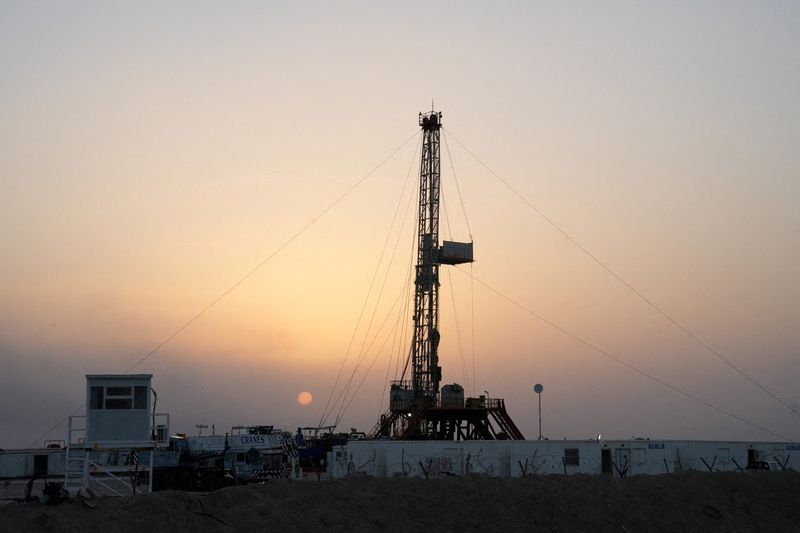By Arathy Somasekhar
HOUSTON (Reuters) -Oil prices rose 2% on Wednesday to their highest in more than a month as cooling U.S. inflation data spurred hopes that the Federal Reserve is getting closer to ending its cycle of interest-rate hikes and cushioned the impact of a small build in U.S. crude oil stocks.
Brent crude settled up $1.72, or 2.01%, at $87.33 a barrel, its highest since late January, while U.S. West Texas Intermediate closed up $1.73, or 2.1%, to $83.26, its highest in five months. Prices rose about 2% on Tuesday.
The U.S. Consumer Price Index (CPI) climbed 0.1% last month after advancing 0.4% in February, the Labor Department said. In the 12 months to March 31 the CPI increased 5%, the smallest year-on-year gain since May 2021.
"The weaker U.S. CPI print has raised doubts over whether the Fed will now hike rates at all next month," said Fawad Razaqzada, market analyst at brokerage StoneX. "Falling interest-rate expectations is reducing recession concerns and helping to support buck-denominated asset prices at the same time."
U.S. President Joe Biden's top economic adviser and ex-Federal Reserve vice chair, Lael Brainard, also said she was seeing inflation coming down.
The dollar dropped sharply after the data. A weaker U.S. currency makes dollar-priced oil cheaper for buyers holding other currencies.
Hedge fund were buying oil futures in the market over the past few days in anticipation of improving demand, said Dennis Kissler, senior vice president of trading at BOK Financial.
Markets shrugged off a small build in U.S. crude oil stocks, attributing it in part to a congressionally mandated release of oil from the U.S. emergency reserve and lower exports at the start of the month.
Crude inventories rose by 597,000 barrels in the last week to 470.5 million, compared with analysts' expectations in a Reuters poll for a 600,000-barrel drop. Gasoline and distillate stocks drew less-than-expected.
A report from the American Petroleum Institute (API) showed crude inventories rose by about 380,000 barrels in the last week, while gasoline inventories were also higher, according to sources.
Meanwhile, the global oil market could see tightness in the second half of 2023, which would push oil prices higher, said Fatih Birol, executive director of the International Energy Agency.
The top U.S. shale basin has not seen peak production, Occidental Petroleum (NYSE:OXY) Chief Executive Vicki Hollub said, while Pioneer Natural Resources (NYSE:PXD) chief executive Scott Sheffield said Wednesday that if oil prices break above $90 per barrel, then prices will likely reach $100 per barrel this year.

In a negative for oil demand, the International Monetary Fund on Tuesday trimmed its 2023 global growth outlook, citing the impact of higher interest rates.
The market is also waiting for clarity on oil demand and supply, with monthly reports from the Organization of the Petroleum Exporting Countries (OPEC) and the International Energy Agency due on Thursday and Friday, respectively.